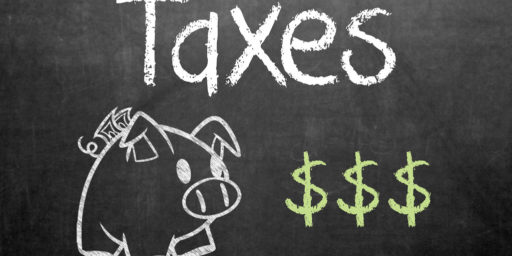HOW LOW IS ENOUGH?
Kevin Drum argues that we have cut taxes and spending to the bone to the point where we can’t afford a decent society:
So given the fact that over the past 30 years we’ve been steadily cutting taxes on the rich, cutting federal spending, cutting welfare programs, and cutting Social Security, let’s ask the question again: How low is low enough? How much cutting of these programs will satisfy you?
I totally reject this premise.
Federal spending is skyrocketing, we seem to be adding new programs all the time, and Social Security is easily the biggest chunk of the federal budget. When have we cut any of that?
Kevin bases his argument on comparing overall spending to GDP and by noting that we are steadily moving the SS retirement age from 65 to 67. The problem with that is that, as our GDP has increased, so has our real level of prosperity. Our GDP has far outpaced inflation and by almost any measure you want to choose, our standard of living is geometrically improved over the last half century. And, compared to our expected mortality rate, 67 is much younger now than 65 was in 1932 when SS was created.
And, yes, marginal rates on the rich (a class I am unlikely to join, btw)have decreased since the JFK cuts, the actual percentage of taxes paid by the rich continues to escalate. The data on this are constantly cited, but here’s one from ABC News/AP data:
The wealthiest 5 percent pay more than half the taxes, while people in the bottom half pay just 4 percent.
Two-income households are increasing, putting more families in the top slice of taxpayers. Millions of small businesses and partnerships are up there, too, paying personal instead of corporate income taxes. Many other people were boosted by the 1990s stock market boom.President Bush’s big tax cut will prevent the wealthy from paying an even greater share in coming years. But key provisions, such as the gradual doubling of the child tax credit, will reduce or eliminate income taxes for many middle-income people while the rich won’t qualify.
“This trend is not going to reverse,” said Scott Hodge, executive director of the Tax Foundation, a nonpartisan tax education and research group. “This will be the demographic for the 21st century taxpayer.”
So, contrary to the liberal myth, the rich are certainly paying their fair share.
In the same post, however, Kevin makes an argument I tend to agree with:
As conservatives themselves point out tirelessly, the poor in America do have access to healthcare, but because of the crazy quilt nature of our public/private/emergency room system, the cost of this care is far higher than it should be. In fact, the best argument for a national health plan — aside from its eventual inevitability for technical reasons — is that it would probably lower the amount we spend on healthcare, not increase it. A national healthcare plan is a bid for more efficiency, not for more government giveaways.
Kevin is almost certainly right on the benefits and inevitability of a centralized health care system. I do worry about loss of incentive to innovate as well as the inevitability of government-imposed rationing. Granted, right now the rationing already exists for some on an economic basis, but the threats to individual liberty are quite different.
We are already creeping toward socialized medicine, with the poor, the old, some veterans, and all military personnel (off the top of my head) participating. My guess is the gaps will be filled in the next twenty years or so.






James:
You cite ABC/AP Data:
“The wealthiest 5 percent pay more than half the taxes, while people in the bottom half pay just 4 percent.”
And then you draw this conclusion:
“So, contrary to the liberal myth, the rich are certainly paying their fair share.”
Your statistic is meaningless and removed from context, and it doesn’t in and of itself support your conclusion. It may be true that more than half of all of the government’s revenue comes from the richest 5%, while the poorest 50% only account for 4% of revenue. That means that, on average, each person in the richest 5% pays on the order of 100 times as many dollars on April 15 as each person in the bottom 50%.
Fair enough, but the picture isn’t complete without knowing how income is distributed between these two classes of people. If, for instance, the richest 5% earn 1000 times as much as the bottom 50%, then that means that the effective tax rate for the top 5% is one tenth that of the bottom 50%.
The conclusion that you draw depends on what you think constitutes a “fair share” of taxes. If your idea of fair is that the top 5% of earners should pay 5% of the taxes, and the bottom 50% should pay 50% (e.g., everyone pays $10,000), then it really doesn’t matter what the income distribution is. (I, personally, think that system would be woefully unfair.) Otherwise, however, you are obligated to look at income distribution, or else your analysis is incomplete and it is entirely possible that you are arguing for the situation that I describe above. Should the rich be asked to contribute, e.g. 6% of their income while the poor pay 60%?
Of course, I don’t know that the richest 5% earn 1000 times as much as the bottom 50%. But the statistics you quote don’t include that information. As you can see, it’s pretty important data if you want the whole picture.
MW,
I don’t have the data in front of me nor the time the research it this minute. But, clearly, since we have a progressive tax system, the top 5% are paying more tax as a percentage of their income than are those in the lower brackets. Now, again, that is only wage income–not Social Security, state and local, etc., etc.
If 5% pay 50% of the income, and 50% pay 4%, though, it’s not a 100 to 1 ratio. Let’s say the whole federal budget is one dollar and there are 100 people in the country. (I’m pretty sure those figures aren’t right, BTW.) You then have five people paying 10 cents each, or 50 cents of the dollar. You have 50 people paying a total of 4 cents, or 0.0008 cents dollars each.
And, yes, one can come up with infinite definitions of fair.
Michael,
To answer your question, look at the marginal tax rate. The rich pay a higher marginal rate than the poor do, so they do pay a larger PORTION of their income in taxes.
I’m a bit wary of setting the tax code based upon such notions of “fairness” as that term is rather slippery — if I don’t get my way, nothing is ever fair!
I prefer, instead, a tax policy set up based on efficiency. What is the tax system that will promote maximum economic growth while providing the government with the necessary revenue for things that the government can better do than the private sector (which includes defense, some social welfare services, etc.)
James made my points simultaneously. Well said. I thought this was a very good post.
My only concern regards your comment about national health care, wherein your conclusion was a bit ambiguous. I would imagine that you (James) are as suspicious of “Hillarycare” as I am (though I could be wrong), and that there are other fixes to the system that should be considered before more federalization of the health care system. Tort/malpractice reform is the most obvious candidate.
I’m very suspicious of a government program, although I see us heading in that direction. I’m waaay out of my area of expertise here but, intuitively, I would like to see a system that provided some number, say five, insurance-type programs of different coverage levels starting with a “gold” platform that covered everything under the sun down to a “basic” program that was for catastrophic care. People would pay for it like they do now, maybe with employer input, and everyone would qualify for it as a group plan regardless of pre-existing conditions. People who are destitute would be subsidized, but they already are.
Kevin misses the point, (as usual)
“Kevin Drum argues that we have cut taxes and spending to the bone to the point where we can’t afford a decent society”
Since when did government give anyone a “decent society?”
A simple romp thru a history book tells you that any time a goverment tried to make such a place it did the opposite.
Bigger goverment has never made a country great. If that were the case, Iraq would have been a freaking paradise and the Soviet Union would have been Utopia.
What has made America great is reward for productivity and innovation.
Just exactly how does goverment raising taxes do that?
You can argue with numbers all day long. His whole theory is flawed beyond repair.
James & John:
>I don’t have the data in front of me nor the time the >research it this minute. But, clearly, since we have a >progressive tax system, the top 5% are paying more tax >as a percentage of their income than are those in the >lower brackets. Now, again, that is only wage income–>not Social Security, state and local, etc., etc.
You’re begging the question here. Sure, the nominal rate is progressive, but those in upper brackets are less affected by FICA and Social Security taxes (which are capped). Also, those in upper brackets pay less than the nominal rate because of things like the SUV deduction, the capital gains tax rate (which is 20%, I believe), and inheritance and dividend income (which soon will not be taxed at all.) There are simply more deductions and more loopholes when you’re wealthy.
>If 5% pay 50% of the income, and 50% pay 4%, though, it’s >not a 100 to 1 ratio. Let’s say the whole federal budget is >one dollar and there are 100 people in the country. (I’m >pretty sure those figures aren’t right, BTW.) You then >have five people paying 10 cents each, or 50 cents of the >dollar. You have 50 people paying a total of 4 cents, or >0.0008 cents each.
Your math is dodgy. 50 people paying 4 cents total works out to .08 cents each, or roughly 1 tenth of a cent, or exactly 0.0008 dollars. 10 cents divided by .08 cents is 125, which is, as I said, on the order of 100 times as much.
>And, yes, one can come up with infinite definitions of fair.
Agreed. It is simply my point that you have to decide which one you’re using before you know whether or not you have enough information to persuasively argue that the situation fits your definition.
Then John wrote:
>I’m a bit wary of setting the tax code based upon such >notions of “fairness” as that term is rather slippery — if I >don’t get my way, nothing is ever fair!
>
>I prefer, instead, a tax policy set up based on efficiency. >What is the tax system that will promote maximum >economic growth while providing the government with >the necessary revenue for things that the government can >better do than the private sector (which includes defense, >some social welfare services, etc.)
That’s certainly “fair”, I guess. I was only arguing on the grounds of “fairness” because that was the word that James used. Viz., “So, contrary to the liberal myth, the rich are certainly paying their fair share.”
George-
>What has made America great is reward for productivity >and innovation.
>
>
>Just exactly how does goverment raising taxes do that?
Well, roads and schools certainly create an environment where productivity is boosted and innovation is encouraged. Police and fire services help protect all of that wealth that is the result. All sorts of R&D has come out of the public sector; the internet, for example — it’s hard to imagine the private sector putting the internet together.
Michael:
You’re begging the question here. . . No–I explicitly said that I was only talking about income taxes, not SS (FICA) or anything else. And those on the lower end of the scale pay much less than the nominal rate; indeed, they often pay nothing in income taxes after the standard deductions, earned income tax credit, and such.
Fairness Well, it satisfies my concept of fairness, anyway :). Many people seem to believe the rich don’t pay taxes and that somehow the “middle class” has almost all the burden. It just isn’t true.
Your math is dodgy. . . Oops! You’re right. I did 4 cents as .04 dollars, divided by 50, and then expressed it as cents rather than dollars.
—